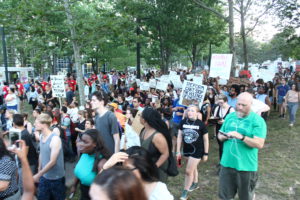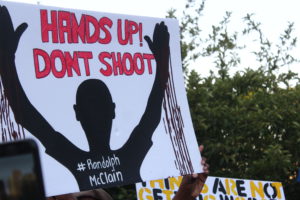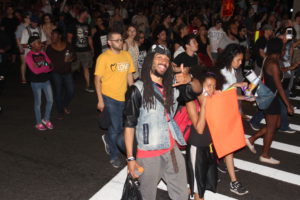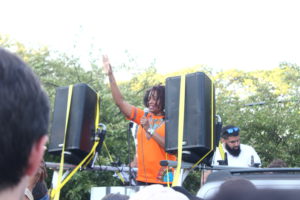 In light of the recent murders of Black people across the country, activists and organizers in the city of Boston have renewed calls for residents to take the streets back and voice their unrest. These past two weeks have seen a resurgence of rage following the circulation of videos showing summary executions of African Americans. Organizers in Boston wasted little time in joining the chorus of dissent, having for the past week hosted community events pertaining to these injustices every day.
In light of the recent murders of Black people across the country, activists and organizers in the city of Boston have renewed calls for residents to take the streets back and voice their unrest. These past two weeks have seen a resurgence of rage following the circulation of videos showing summary executions of African Americans. Organizers in Boston wasted little time in joining the chorus of dissent, having for the past week hosted community events pertaining to these injustices every day.
Participants came from a wide array of organizations and causes, including local union organizers, living wage campaigners, housing justice advocates, international solidarity movements, and more. Over the weekend alone two marches took the streets, led by organizers from Mass Action Against Police Brutality and Black Lives Matter affiliates. Notably on Saturday July 9 there had originally been planned a speak out near Dudley station. However because it was so well attended and there was a lot of energy, Mass Action organizers quickly adjusted their plan and organized a route from Dudley toward Grove Hall.
 Thus a contingent of over 300 took the streets of Roxbury in order to bring their message to the whole neighborhood. Namely, that policing in New England has a brutal history, which will not be hidden.
Thus a contingent of over 300 took the streets of Roxbury in order to bring their message to the whole neighborhood. Namely, that policing in New England has a brutal history, which will not be hidden.
July 10 saw a similar gathering at Downtown Crossing, heeding the call of a Black Lives Matter Boston affiliate to “Come together to take action, stand in solidarity and let the world know we will no longer tolerate social injustice.”
Hundreds marched from Sumner street to Dudley station, the event culminating in another speak out across the street from the Roxbury station.
 These actions built the energy for an action on July 13, one of the largest demonstrations in recent Boston history. The Unity March Against Police Terror was initiated by Mass Action Against Police Brutality as day commemorating the anniversary of the death of Sandra Bland, found hanged in a Texas jail, as well as renewing the calls for justice for all victims of police brutality across the country. Congregating behind the Boston Police Headquarters, thousands bore witness to the stories of family members of the victims of police brutality in Massachusetts.
These actions built the energy for an action on July 13, one of the largest demonstrations in recent Boston history. The Unity March Against Police Terror was initiated by Mass Action Against Police Brutality as day commemorating the anniversary of the death of Sandra Bland, found hanged in a Texas jail, as well as renewing the calls for justice for all victims of police brutality across the country. Congregating behind the Boston Police Headquarters, thousands bore witness to the stories of family members of the victims of police brutality in Massachusetts.
Some of the featured speakers included Mary Holmes, who was violently attacked and falsely arrested by MBTA Transit Police; Shahida Wright, sister of Usaamah Rahim who was shot and killed by officers with the Joint Terrorism Task Force; Carla Sheffield, mother of Burrell Ramsey-White who was killed by Boston Police and family members of Randolph Mcclain, who was killed by police in Lynn, MA. The organizers of Mass Action Against Police Brutality stressed their principles by refusing to collaborate with the police, calling for a return to the uncompromising principles and militant organizing tactics of yore with a focus on working with families to support their quest for justice.
 Thousands poured onto Ruggles street, beginning the long trek to Dudley, moving from the Boston police HQ toward the center of community organizing, or as one speaker put it: “Marching from one of the sources of the problem, to one of the solutions.”
Thousands poured onto Ruggles street, beginning the long trek to Dudley, moving from the Boston police HQ toward the center of community organizing, or as one speaker put it: “Marching from one of the sources of the problem, to one of the solutions.”
Police officers saturated the outskirts of the event, following on vehicles and surveilling with rooftop observers. There were no reported arrests.
One of the most breathtaking moments of the demonstration was when Dudley station, one of the biggest transportation hubs, was brought to a standstill, packed with protesters chanting for their freedom.
Once the group reached the Dudley Commons, Mass Action organizers created yet another space for members of the community to come together and speak about next steps after the action. While there was a cathartic sense of accomplishment among the participants for completing the arduous journey, one organizer was quick to remind everyone “This wasn’t a march; we didn’t have hundreds of thousands of people taking the streets, this was an organizing meeting. The real work starts now.”
Boston activists have demonstrated this past week and beyond that they are committed to standing in solidarity with brothers and sisters who are experiencing regular crackdowns in their pursuit for justice. They continue waging the fight to stem the traumas inflicted on our most vulnerable communities on all fronts, including police brutality as well as wage stagnation, gentrification, and austerity measures against our public schools.






